Latest episode
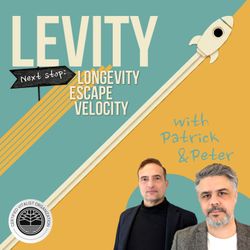
#37 The Anti-Catastrophe League
44:50|Tom Ough tells us about the Big Things that may end humanity - and what we can do and in some cases have done to prevent these. Did you know that if all the risks, the one that is most likely to end you is aging? What are we doing to stop aging? Tom is a journalist and writer who is currently Senior Editor at UnHerd, a London‑based online magazine of culture and opinion. After several years working at The Telegraph, he moved into research on global catastrophic risks and wrote a nonfiction book titled The Anti‑Catastrophe League about individuals and efforts to prevent humanity’s extinction, and he also co‑hosts the Anglofuturism podcast.-- IN THIS EPISODE WE LEARN --Why aging itself can be understood as a catastrophic risk, and what it would mean to treat it with the same seriousness as other existential threats.What it would actually take to detect, deflect, or survive an asteroid impact.Why space expansion and Mars are a part of long-term civilizational resilience.Why some catastrophic risks may be overestimated, and how to think more clearly about climate change relative to other existential threats.What we know about super-volcanoes, why they’re rare but devastating, and why preparedness matters despite uncertainty.How nuclear war remains a central catastrophic risk, and why deterrence, miscalculation, and escalation still deserve serious attention.How to think about AI risk, what distinguishes it from past technological threats, and why uncertainty makes governance difficult.What p(doom) means, why people disagree so strongly about it, and how probabilities shape policy and public discourse.Who typically gravitates toward anti-catastrophe thinking, and what motivates people to focus on low-probability, high-impact risks.What Anglo-futurism is.
More episodes
View all episodes

36. #36 How crypto is sparking a longevity frenzy
01:48:15||Ep. 36Today we’re diving into one of the strangest and most ambitious ideas in longevity: using crypto trading to fund real-time lifespan experiments.Benji Leibowitz, founder of pump.science, joins us to explain how decentralized science works, why tokens can finance studies in worms, flies and mice, and what happens when a single post on X suddenly turns Metformin into a viral experiment. That intervention, by the way, is being spearheaded by LEVITY friend Linus Petersson, founder of the Swedish Longevity Cluster, who also joins the discussion.In this episode we announce our new collaboration with pump.science. For now, that means they’ll contribute written content to the LEVITY newsletter - and later we may explore a dedicated Youtube format together.More info here: https://reachlevity.com/p/desci-is-exploding-we-re-partnering-with-pump-science-to-help-you-follow-itAnd check out pump.science's first post here: https://reachlevity.com/p/the-most-radical-idea-in-longevity-right-nowKey highlights in this episode:– How pump.science turns attention and trading volume into funding for worm, fly, and mouse experiments.– Why decentralized science emerged, and what problems in traditional science it tries to fix.– What tokens, smart contracts, and DAOs actually mean in practice.– Why Solana, not Ethereum, underpins the system.– How real-time experimental data (like fly racing) could change how we evaluate longevity interventions.-----🗞️ SUBSCRIBE to the LEVITY newsletter: reachlevity.com/subscribeGet all LEVITY DeSci content here: reachlevity.com/t/desci (sorry about the wrong link in the episode)📕 Check out Patrick's book: https://mitpress.mit.edu/9780262543163/the-case-against-death/📗 Check out Peter's book (only available in Swedish): https://www.adlibris.com/sv/bok/evigt-ung-min-och-manniskans-drom-om-ododligheten-9789179652524-----Show notes for this episode will be available soon after this airs. Sign up for the LEVITY newsletter to get them straight to your inbox: reachlevity.com/subscribeLEVITY is co-hosted by Patrick Linden, philosopher and author, and Peter Ottsjö, journalist and author.CHAPTERS00:00 Intro – How crypto could fund longevity & Pump Science × LEVITY05:14 DeSci 101 – fixing broken incentives in science07:00 Benji’s origin story: lucid dreams, superheroes & cancer genomics08:45 Discovering crypto & using incentives to fix healthcare15:52 What’s broken in science funding – and why DeSci might help30:20 Is crypto just belief? Money, gold and “Ponzi scheme” fears37:44 Linus Petersson joins + crypto glossary (tokens, smart contracts, NFTs)59:18 Vitalik’s retweet, 40× price spike & $14k for Linus’s experiments1:10:24: How to “play”: exchange accounts, Phantom wallet & buying a token1:17:50: Why does the website look like a retro video game forum?1:20:53 Network state for not dying – community, human trials & products1:27:45 Why scientists are skeptical & how to recruit labs and students1:32:15 Kings of the pill & the coming longevity leaderboard1:39:59 Skepticism vs optimism, call to action & book recommendations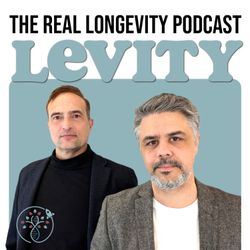
35. #35 The Anti-Aging Uprising: Felix Werth’s Political Attack on Death Itself
01:24:36||Ep. 35Valuable time is being lost because there is not enough funding for science with real life-extending potential. No major political party is promising to address aging, even though aging harms and kills more people than anything else. Most people—and most leaders—still do not understand that aging is both a problem and something that can be solved through science. We need a political movement that demands action and insists that something be done to save our lives. And this is where this episode's guest comes in. Felix Werth is the founder and chairman of the German Party for Rejuvenation Research — a political movement dedicated to accelerating scientific progress in regenerative medicine and longevity. Originally trained in biochemistry, Werth founded the party in 2015 (then called the Party for Health Research) to push for greater public investment in research aimed at combating aging-related diseases. Through his activism, Werth has helped bring the topic of longevity and healthy life extension into the political conversation in Germany and across Europe.In this episode you'll learn more about:The longevity scene in GermanyHow to start a longevity partyHow to get the message outA dating site for the longevity communityUsing AI to solve within SENS CHAPTERS00:00 Introduction01:08 Berlin and the global longevity community05:20 Who is Felix werth and why did he start the longevity party?15:00 How he started the party 21:49 The public's reaction27:16 Why change the message from health to longevity?32:50 Message strategy: posters and videos34:34 Funding issues39:20 Campaign video41:50 Dating site for longevity people44:45 Does Felix recommend forming a political party?54:20 What is the optimal outcome for the party?59:00 Is there any support for longevity among the German elite and government?01:04:20 Using AI to solve aging within the SENS approach01:10:16 Winning aging hacking contest with the West-Coast Vectors01:16:00 Using de-sci for funding, Pump-Science01:23:00 How do you keep in shape?01:24:29 Do you do any extreme risk-avoidance?01:25:22 Three good books
34. #34 Biomarkers of aging: How close are we, really? - A conversation with Sara Hägg
01:36:22||Ep. 34Sara Hägg, PhD is an associate professor at Karolinska Institutet, where she leads the Molecular Epidemiology of Aging Group. Her work focuses on human biomarkers of aging - especially biological age “clocks” built from epigenetic, proteomic, and metabolomic data - and on turning Nordic registry resources into clinically useful aging measures.In this episode:* What biological/epigenetic age clocks actually measure (and what they don’t)* Accuracy, error bars, and why clocks aren’t clinic-ready yet* Epigenetic vs. proteomic vs. metabolomic clocks - strengths and trade-offs* Organ-specific clocks (liver, ovary, kidney) and what they reveal* Why uncertainty spikes at life transitions; menopause as a natural “stress test”* PC (principal-component) clocks and noise reduction* Nordic registry & Swedish Twin Registry advantages; UK Biobank use* Direct-to-consumer tests: interpreting results and common pitfalls* AI’s role in building/validating clocks and handling uncertainty* What would move the field fastest (data, standards, trials) and where Sweden standsShow notes for this episode will be available after this airs. Sign up for the LEVITY newsletter to get them straight to your inbox: reachlevity.comLEVITY is co-hosted by Patrick Linden, philosopher and author, and Peter Ottsjö, journalist and author.CHAPTERS00:00 Introduction03:27 Why Sweden lags behind in longevity science08:04 Nordic registry & Swedish twin registry advantages; UK Biobank use10:05 What is biological age?16:33 The rise of epigenetic clocks24:22 The importance of aging clocks32:04 Beyond methylation: proteomic and metabolomic clocks35:12 Organ clocks39:37 Do aging clocks generalize?54:37 The cost of aging clocks01:03:18 Uncertainty and AI01:17:10 Solving aging - where do we stand?01:28:10 Book recommendations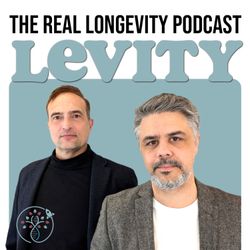
33. #33 “Can death be the answer?" A conversation with philosopher Nicholas Agar
01:44:30||Ep. 33We are always excited about the next technological solution. But what if it does not come? Or what if it comes only for the few, or with terrible side-effects? And while we are waiting for the easy tech fix, are we neglecting what we can do now to better our lives?Many of our previous guests have been excited about the prospect of radically extending our lives, and some have been optimistic about the prospect of achieving this in our life time, perhaps even within a few decades. We are Levity, the real longevity podcast after all.Todays guest thinks that we should be less excited about radical longevity, and radical enhancements in general. And he does not think radical life extension is on the horizon.Nicholas Agar is a New Zealand philosopher specializing in ethics. He holds a BA from the University of Auckland, an MA from Victoria University of Wellington, and a PhD from the Australian National University. As of 2022, he is a Professor of Ethics at the University of Waikato. He is a prolific writer and the author of How to think about Progress, and Truly Human Progress, to mention two recent books.CHAPTERS00:00 Introduction03:38 The hype and the reality06:02 Too much enthusiasm for radical life extension -- or too little?17:15 Distribution worries -- more life only for the rich?23:06 Pessimism about distribution and feasability29:00 Structural reasons for bad science and big promises33:30 Is it wise to spend money on radical life extension?37:13 Should we die if we have had good life?48:48 Deat as tool for solving housing crisis58:27 Liberal eugenics01:06:45 How to attract funding -- hype + conservative grant proposals01:09:40 What is enhancement?01:25:30 A mechanical Roger Federer with robot arms01:38:12 Is it bad to cease to exist?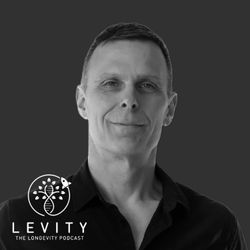
32. #32 “Medical malpractice”: Matt Kaeberlein on biological age tests
01:50:07||Ep. 32One idea I’ve had lately is to put together a list of people to trust in geroscience and the longevity field more broadly. (And I might do it - keep an eye on reachlevity.com- and subscribe while you’re at it!)Matt Kaeberlein would not only make that list - he’d likely be right at the top. He’s rigorous, precise in his wording, and always puts integrity ahead of hype. But, and this is important, I wouldn’t characterize him as a skeptic. He’s a realist who insists on evidence, yet at the same time he’s visionary and deeply optimistic about what aging science can deliver.Matt is probably best known for his pioneering work on rapamycin and for co-founding the Dog Aging Project. In this episode, though, we also talk about Optispan - his proactive healthcare company - and Ora Biomedical, where the WormBot platform is screening thousands of interventions for effects on lifespan. We get into therapeutic plasma exchange (TPE), how artificial intelligence might accelerate discovery, and even his favorite science fiction books.And true to form, Matt doesn’t hold back. He calls out irresponsible use of biological age tests - going so far as to label it “medical malpractice” - and criticizes hype-driven actors, sloppy science communication, and the inertia of institutions like the NIH. At the same time, he shows how rigorous, honest work could move the entire field forward.-----🚀 Special offer for our LEVITY audience: Join Vitalism today and receive a 30% discount on your membership using the code LEVITY at checkout. https://www.vitalism.io/membershipShow notes for this episode will be available soon after this airs. Sign up for the LEVITY newsletter to get them straight to your inbox: reachlevity.com-----CHAPTERS00:00 Teaser01:38 Introduction to Dr. Matt Kaeberlein11:50 mTOR and rapamycin21:37 The Dog Aging Project51:08 Personal experiences with rapamycin01:05:33 The inertia of the NIH01:08:54 The right to try law and access to experimental therapies01:13:21 Ora Biomedical and The WormBot Platform01:21:41 The role of AI in longevity research01:28:29 Optispan: A new approach to proactive healthcare01:33:56 Biological age tests01:39:39 Therapeutic plasma exchange: A personal experience01:46:39 Book recommendations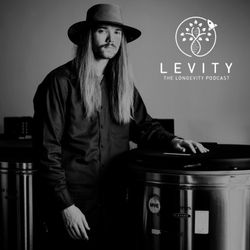
31. # 31 He wants to save your pet with cryo - The Kai Micah Mills interview
02:08:54||Ep. 31When you give a child a pet, you also expose them to death—since most pets pass away long before their owners. But what if we could cryopreserve Buddy or Tiger, and bring them back from suspended animation once we have a cure for what ended their lives?Kai Micah Mills is a pioneering figure in radical life extension and biostasis. As the founder of Cryopets, he is leading efforts to make cryopreservation accessible for pets, with aspirations to extend these technologies to humans. He left high school early to pursue entrepreneurship, becoming a tech entrepreneur in his teens. A Thiel Fellow and co-founder of CryoDAO and HydraDAO, Kai is deeply involved in decentralized science initiatives aimed at advancing longevity research.00:00 Introduction04:44 Timeship in Texas05:36 Vitalism11:54 Bryan Johnson, Mormonism and Vitalism18:25 Dropping out of highschool to play video games24:25 Becoming a Thiel Fellow40:37 Why Cryonics?49:53 We want Immortality53:19 Cosmism01:01:36 AI01:05:47 Building Cryopets01:27:42 Cryonics science01:37:24 Cryo rat01:46:01 CryoDAO HydraDAO and replacement01:59:30 Talent shortage in cryogenics02:05:08 Book recommendations